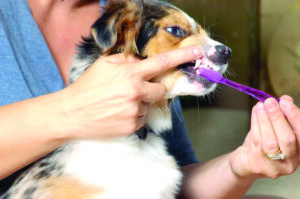By Dr. Beth Leermakers
Do you hold your nose and push your dog away when she snuggles up to you? Bad breath (halitosis) isn’t just unpleasant. It can be a sign of an underlying dental or other health problem.

Photo courtesy of the American Kennel Club
Causes of Canine Bad Breath
Dental or gum disease. The most common cause of halitosis in dogs is periodontal disease resulting from plaque and tartar buildup. Plaque is a sticky build-up of bacteria (known as biofilm) on the teeth. The minerals in saliva (such as calcium) harden the plaque, forming tarter. As the plaque ages, the bacterial flora in the dog’s mouth changes from good to destructive bacteria. The bad bacteria causes tooth decay that produces smelly sulfur compounds. Small and flat-faced dogs are more prone to dental disease for three reasons: their teeth are closer together, smaller dogs live longer, and their owners tend to feed them softer food.
Kidney disease. Kidneys are the body’s filtration system. When the kidneys aren’t functioning properly, a dog may start to build up toxins (urea) in their blood. The urea can make the dog’s breath smell like ammonia or urine.
Liver disease. The liver also filters toxins from the body. When a dog’s liver isn’t functioning properly, toxins build up, causing bad breath. If your dog has jaundice (yellowing of the eyes or skin), poor appetite, weight loss and vomiting in addition to bad breath, liver disease may be the reason.
Diabetes. When diabetes isn’t treated, the body breaks down fat, producing ketones. Those ketones make the dog’s breath smell sweet or fruity. Other symptoms of diabetes include changes in appetite, weight loss, and increased thirst and urination.
Ate something toxic. Eating a toxic plant can lead to breath that smells rancid or like something rotting. If your dog eats a cigarette, her breath may smell like nicotine.
Pica. Pica is a common condition in which dogs eat non-food items such as garbage, cloth, paper, dirt and feces. Breath that smells like fecal matter may be due to eating poop. If your dog eats a sock (that he can’t digest) or gets a stick or other foreign body stuck in his mouth, she can develop rotten-smelling breath.
Oral tumors. Older animals may have oral cancers or tumors (such as melanoma and squamous cell carcinoma). As the tumors grow, they can get infected and tissue dies, leading to bad breath.
Nutritional deficiencies. Raw or home-cooked diets may disrupt the normal balance of bacteria in the mouth or gut. Raw diets can cause bacterial imbalances and Salmonella overgrowth in the gut, leading to bad breath. If you feed a home-cooked or raw diet, consult with a veterinary nutritionist to be sure you’re meeting your dog’s dietary needs.
How to Eliminate Bad Breath
1. Visit your veterinarian to diagnose and treat (or rule out) underlying conditions: dental, liver or kidney disease. Schedule a dental exam to detect periodontal disease. Your dog may need regular cleanings to prevent plaque and tartar buildup.
2. Brush your dog’s teeth daily or weekly to prevent plaque formation. Use a toothpaste that is specially formulated for dogs.
3. Dental treats and products. Chewing a crunchy dental treat can physically remove plaque. Dental water and some dental treats mask bad breath and promote oral health through additives.
4. Dental diets. Larger kibbles with a coarse texture scrape the teeth, removing plaque as your dog chews. Visit the Veterinary Oral Health Council (VOHC) website (vohc.org) to view lists of Accepted Products (dental diets, chews and supplements) that are safe and effective.
5. Probiotics. Probiotics improve gut health, helping some dogs whose intestinal problems cause pica. Probiotics may also improve breath by killing odor-causing bacteria in the mouth.
6. Supplements that prevent coprophagia (eating feces). Some chews include breath fresheners as well as deterrents to snacking on poop.
7. Carrot sticks and apple slices. Chewing these crunchy foods scrapes away plaque.
8. Coconut oil. Extra-virgin coconut oil can improve your dog’s breath. It may also help dogs lose weight, increase their energy and soothe dry skin.
By paying attention to your pooch’s oral hygiene, you’re protecting her health while you freshen her breath. Bring on the slobbery kisses!
